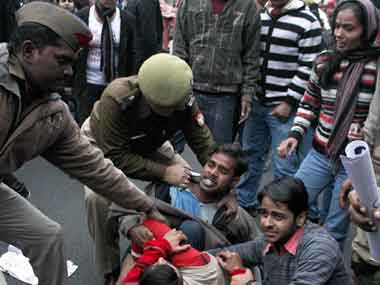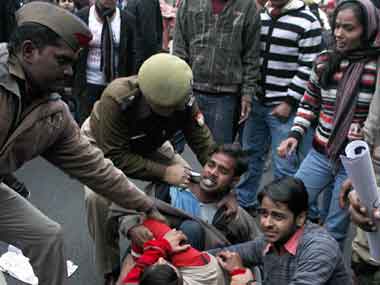The angry protests against the increasing criminalisation and lumpenisation of New Delhi over the last two weeks have captured the attention of the entire world. While there are protests all over the globe, significantly the anti-capitalist sit-in movement of Washington, there has seldom been such a spontaneous and leaderless urban movement demanding security and safety for women and quick justice for brutal crimes. By any standard, the pro-woman movement was noteworthy and may in course of time be counted as a historic protest movement which erupted in a capital city of a nation in the throes of great changes. It’s a nation which in its hurry to hurtle to a new future forgot its own women, forgot its marginalised and looked away from the increasing squalor.[caption id=“attachment_576383” align=“alignleft” width=“380”]
 Rise of the middle class Indians. PTI [/caption] Apart from the immediate questions which the brutal rape has raised, there are larger questions which the increasing number of protests in Delhi evokes. Whether it was against corruption, against statism or against criminal acts, the movements that rocked Delhi, and thus India, over the last year occurred mostly outside the normal political purview and was bereft of party patronage. This primarily showed that political parties in India, focused only on electoral calculations, have largely been disconnected from urban and modern issues. The young middle class, the social networking and smart phone wielding youth, which led the Delhi protests be it 2G, anti-corruption movement of Anna Hazare, Arvind Kejriwal etc. have raised issues which don’t directly fall into the agenda of mainstream parties. The concerns of all sections are valid but in the process a huge class of people—urban, educated, mostly non-politicised or unconcerned about who wins elections—has been left out of all national debates. These are the classes of people who are getting ready to occupy the new India. Their concerns are fully urban: safety in city life, problems of daily commute, the value and retention of urban, informal jobs etc. They are utterly aspirational and often focused on attaining this. Mind you they did not hit the streets to protest against the LPG price rise nor are they bothered if the petrol price goes up. The rape victim who finally prodded the nations conscience was a classic example of this type of person who emerged from the village and sought, against odds, to occupy the city and be part of its success story. No political party or leader caters to them nor understands them and hence there was no political leader—urban or rural, man or woman—who had the guts or the sense of hurt to come and address the angry gatherings at India Gate, Jantar Mantar and other places of the new city. All of them dismiss this as a urban phenomenon and nothing to do with the country called India. They may have been scared as well and maybe wondered how this huge disconnect developed. Though all governments are fully engaged in rapid urbanisation (Haryana, Punjab being classic examples) these governments or parties do not know how to cater to the social and other needs of the new aspiring class which come to populate the new suburbia. Few political leaders of the Right or Left or Centre know how to address question of urban identity and belonging and other such aspirations. They just give permission to build the malls and later bring in the big retailers. New Delhi, the capital, has thus become the city of many revolutions (Paris of 1960s?) and street protests because it is here that many thing collide: the gated communities versus the marginalised poor, and all the rest of it. In this city where spaces are being carved out among the enormously rich, the resultant anger spills out to the streets. Both the police and the judiciary are perceived to be partners in this grab-all scenario. The Delhi protests are not just the anger of the dispossessed. It is the anger of those who want to possess. They want a rightful say in the remaking of the city, the refashioning of Delhi, the reformulation of national debates and thus the rebirth of the country itself. Hence the demand for new types of laws, new ways of policing and the overturning of the old patriarchal worldview. They want to remake the big city in the way urban sociologist Robert Park said: “The city is man’s most consistent and on the whole his most successful attempt to remake the world he lives in after his heart’s desire.” India’s aspiring young have, by the many protests in Delhi, established their right to refashion the city and the state. Whatever comes out of the anti-rape protest, it is sure that it has established a mighty moral modern voice right in the centre of national debate and right in the boulevard of republican might, the Rajpath.
Rise of the middle class Indians. PTI [/caption] Apart from the immediate questions which the brutal rape has raised, there are larger questions which the increasing number of protests in Delhi evokes. Whether it was against corruption, against statism or against criminal acts, the movements that rocked Delhi, and thus India, over the last year occurred mostly outside the normal political purview and was bereft of party patronage. This primarily showed that political parties in India, focused only on electoral calculations, have largely been disconnected from urban and modern issues. The young middle class, the social networking and smart phone wielding youth, which led the Delhi protests be it 2G, anti-corruption movement of Anna Hazare, Arvind Kejriwal etc. have raised issues which don’t directly fall into the agenda of mainstream parties. The concerns of all sections are valid but in the process a huge class of people—urban, educated, mostly non-politicised or unconcerned about who wins elections—has been left out of all national debates. These are the classes of people who are getting ready to occupy the new India. Their concerns are fully urban: safety in city life, problems of daily commute, the value and retention of urban, informal jobs etc. They are utterly aspirational and often focused on attaining this. Mind you they did not hit the streets to protest against the LPG price rise nor are they bothered if the petrol price goes up. The rape victim who finally prodded the nations conscience was a classic example of this type of person who emerged from the village and sought, against odds, to occupy the city and be part of its success story. No political party or leader caters to them nor understands them and hence there was no political leader—urban or rural, man or woman—who had the guts or the sense of hurt to come and address the angry gatherings at India Gate, Jantar Mantar and other places of the new city. All of them dismiss this as a urban phenomenon and nothing to do with the country called India. They may have been scared as well and maybe wondered how this huge disconnect developed. Though all governments are fully engaged in rapid urbanisation (Haryana, Punjab being classic examples) these governments or parties do not know how to cater to the social and other needs of the new aspiring class which come to populate the new suburbia. Few political leaders of the Right or Left or Centre know how to address question of urban identity and belonging and other such aspirations. They just give permission to build the malls and later bring in the big retailers. New Delhi, the capital, has thus become the city of many revolutions (Paris of 1960s?) and street protests because it is here that many thing collide: the gated communities versus the marginalised poor, and all the rest of it. In this city where spaces are being carved out among the enormously rich, the resultant anger spills out to the streets. Both the police and the judiciary are perceived to be partners in this grab-all scenario. The Delhi protests are not just the anger of the dispossessed. It is the anger of those who want to possess. They want a rightful say in the remaking of the city, the refashioning of Delhi, the reformulation of national debates and thus the rebirth of the country itself. Hence the demand for new types of laws, new ways of policing and the overturning of the old patriarchal worldview. They want to remake the big city in the way urban sociologist Robert Park said: “The city is man’s most consistent and on the whole his most successful attempt to remake the world he lives in after his heart’s desire.” India’s aspiring young have, by the many protests in Delhi, established their right to refashion the city and the state. Whatever comes out of the anti-rape protest, it is sure that it has established a mighty moral modern voice right in the centre of national debate and right in the boulevard of republican might, the Rajpath.
Protests: A new class stakes claim to India of the future
Binoo K John
• January 2, 2013, 18:13:41 IST
New Delhi, the city of many revolutions, has turned into the cauldron of growing aspirations.
Advertisement
)
End of Article